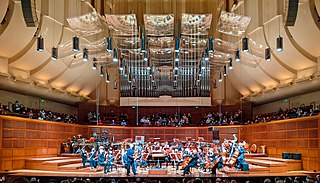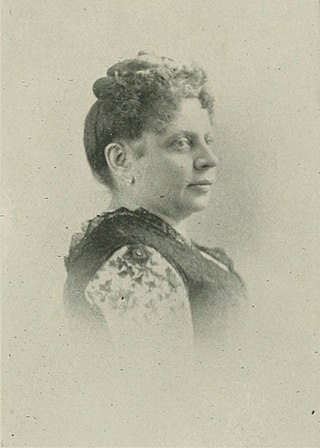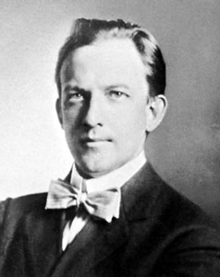
The San Francisco Symphony, founded in 1911, is an American orchestra based in San Francisco, California. Since 1980 the orchestra has been resident at the Louise M. Davies Symphony Hall in the city's Hayes Valley neighborhood. The San Francisco Symphony Youth Orchestra and the San Francisco Symphony Chorus (1972) are part of the organization. Michael Tilson Thomas became the orchestra's music director in 1995, and concluded his tenure in 2020 when Esa-Pekka Salonen took over the position.

This article is about music-related events in 1871.

Tanglewood is a music venue and festival in the towns of Lenox and Stockbridge in the Berkshire Hills of western Massachusetts. It has been the summer home of the Boston Symphony Orchestra since 1937. Tanglewood is also home to three music schools: the Tanglewood Music Center, Tanglewood Learning Center, and the Boston University Tanglewood Institute. Besides classical music, Tanglewood hosts the Festival of Contemporary Music, jazz and popular artists, concerts, and frequent appearances by James Taylor, John Williams, and the Boston Pops.

Susannah is an opera in two acts by the American composer Carlisle Floyd, who wrote the libretto and music while a member of the piano faculty at Florida State University. Floyd adapted the story from the Apocryphal tale of Susannah and the Elders, though the latter story has a more positive ending. The story focuses on 18-year-old Susannah Polk, an innocent girl who is targeted as a sinner in the small mountain town of New Hope Valley, in the Southern American state of Tennessee.

Cleopatra's Night is a short opera in two acts by American composer Henry Kimball Hadley. Its libretto is by Alice Leal Pollock based on the 1838 short story "One of Cleopatra's Nights" by French author Théophile Gautier. The opera premiered at the Metropolitan Opera on January 31, 1920. The opera was revived the following season, and was broadcast on NBC radio in 1929.

Azora, The Daughter of Montezuma is a 1917 opera in three acts by American composer Henry Kimball Hadley to a libretto in English by author David Stevens.

Jerry Hadley was an American operatic tenor. He received three Grammy awards for his vocal performances in the recordings of Jenůfa, Susannah, and Candide. Hadley was a leading American tenor for nearly two decades. He was mentored by soprano Joan Sutherland and her husband, conductor Richard Bonynge. Leonard Bernstein chose Hadley for his 1989 recording of Candide on Deutsche Grammophon. Aside from singing opera and operetta, Hadley also sang on Broadway.
The Song & the Slogan was composed by Daniel Steven Crafts in 1996, on commission from the late opera tenor Jerry Hadley. It sets to music sections of Carl Sandburg’s 1918 prose poem “Prairie” with excerpts from other Sandburg poems chosen by Hadley. The piece premiered in 2000 and was later made into a TV program for Public Broadcasting Service (PBS) Public television. The poem “Illinois Farmer” was set separately as a song and used as an encore at the premiere. In 2003, the production was awarded the Emmy for Best Music from the Mid-America Chapter of the National Academy of Television Arts & Sciences. The documentary was also nominated in three other categories: Best Direction, Best Photography, and Best Editing.

Henry Kimball Hadley was an American composer and conductor.
Long Beach Opera is a Southern California opera company serving the greater Los Angeles and Orange County metroplex. Founded in 1979, it is the oldest continually running opera company in the L.A. area. In June 2019 LBO presented the world premiere of The Central Park Five, an opera by Anthony Davis with libretto by Richard Wesley, about the Central Park jogger case. The opera won the Pulitzer Prize for Music in May 2020.
Events from the year 1735 in Great Britain.

'Safié is a one act opera by American composer Henry Kimball Hadley. The opera's libretto was written in English by Edward Oxenford, but its premiere, on April 4, 1909, in Mainz, Germany, was given in a German translation by Otto Neitzel. Hadley conducted the premiere, and the title role was sung by American soprano Marguerite Lemon.
The Bispham Memorial Medal Award was an award for operas written in English which was named for baritone David Bispham, who was a great proponent of performing opera in English in the United States. It was traditionally awarded to American composers, frequently for an opera on an American subject. It originated from the Opera in Our Language Foundation, Inc., founded by composer Eleanor Everest Freer, and Edith Rockefeller McCormick, in 1921. After David Bispham's death in October 1921, Eleanor Everest Freer also founded the David Bispham Memorial Fund, Inc., in March 1922. Eleanor Everest Freer was chairman, and Edith Rockefeller McCormick was treasurer, of both organizations. On April 7, 1924, the two organizations merged to become the American Opera Society of Chicago. The first medal was awarded by the American Opera Society of Chicago in 1924 to Ernest Trow Carter, for his opera The White Bird, which saw its first full performance at the Studebaker Theater, in Chicago, on March 6, 1924. The last Medal for an opera was awarded around 1953 to Vittorio Giannini for The Taming of the Shrew. The award was funded in part by David Bispham's will, and also in part by Eleanor Everest Freer, who, in addition, was one of its recipients. Other recipients include :
The Great Gatsby is a 1999 opera in two acts written by American composer John Harbison. The libretto, also by Harbison, was adapted from the 1925 novel The Great Gatsby by F. Scott Fitzgerald. Additional popular song lyrics were by Murray Horwitz. The opera was commissioned by the Metropolitan Opera in honor of music director James Levine's 25th anniversary with the company.

A Night in Old Paris is a short dramatic opera by American composer Henry Kimball Hadley with an English libretto by Frederick Truesdell, based on a play by Glen Macdonough. It premiered on December 14, 1924, in a private performance at the Metropolitan Opera House as part of a "Lambs Gambol", a meeting of the Lambs Club, a theatrical club in New York City. About 700 invited guests attended, including Will Rogers. It was first performed for the public in a radio performance on January 20, 1933. Never published, its manuscript full score, vocal score, and orchestral parts are all in the collection of the New York Public Library for the Performing Arts, at Lincoln Center in New York City. The original working title of the opera was Knights of the Hemp.
The Mistress of the Inn, also translated as The Innkeeper Woman or Mirandolina, is a 1753 three-act comedy by the Italian playwright Carlo Goldoni about a coquette. The play has been regarded as his masterpiece. Frederick Davies describes it as Goldoni's Much Ado About Nothing.
Ben Moore is an American composer whose works include art song, musical theatre, cabaret, chamber music, choral music and opera. His songs have been recorded by Deborah Voigt, Susan Graham Nathan Gunn and Lawrence Brownlee on the EMI, SonyBMG, Warner Classics and Opus Arte labels. Other singers who have performed his music include Frederica von Stade, Jerry Hadley, Robert White, and Audra McDonald.
Hadley is a both a surname and a given name that is a transferred use of a place name of English origin that means “heather field.” The name has increased in popularity in recent years for girls in the United States and has ranked among the top 200 names used for American girls since 2011. Spelling variants such as Hadlee and Hadleigh are also in wide use.

Mary E. C. Bancker was an American author. she produced the opera Dovetta in April 1889, in the Standard Theater in New York.
SS Henry Hadley was a Liberty ship built in the United States during World War II. She was named after Henry Hadley, an American composer and conductor.








